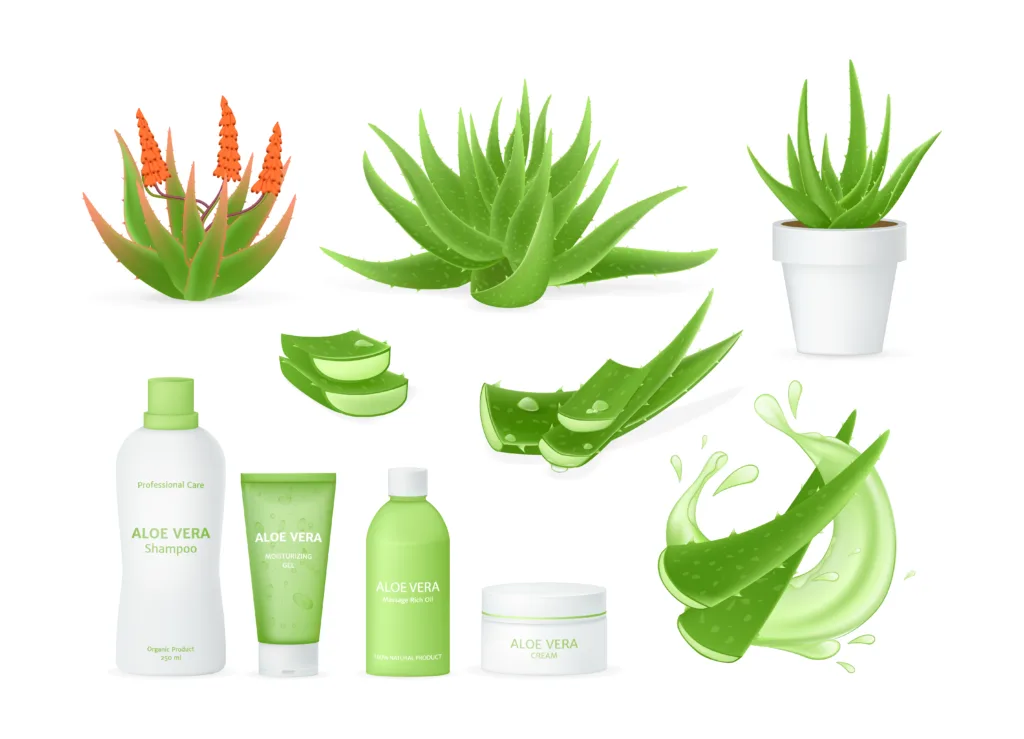
Aloe vera, a versatile medicinal plant with a long history of use in various cultures, offers a multitude of health benefits. From treating dental issues to skin conditions, wounds, constipation, and diabetes-induced foot ulcers, aloe vera has been valued for its healing properties.
Packed with antioxidants and antibacterial properties, aloe vera aids in fighting infections, promoting healing, and managing blood sugar levels. While further research is needed, numerous studies have shown promising results for the uses of aloe vera in medicine.
Key Takeaways:
- Aloe vera is a versatile medicinal plant with various health benefits.
- It can be used to treat dental issues, skin conditions, wounds, constipation, and diabetes-induced foot ulcers.
- Aloe vera contains antioxidants and antibacterial properties that aid in fighting infections and promoting healing.
- Studies have shown its effectiveness in reducing dental plaque, accelerating wound healing, preventing wrinkles, and managing blood sugar levels.
- Further research is needed to fully understand the potential uses of aloe vera in medicine.
The Medicinal Properties of Aloe Vera for Dental Health
Aloe vera, a medicinal plant known for its numerous health benefits, has been found to have positive effects on dental health. Studies have shown that aloe vera tooth gels are as effective as commercial toothpaste in reducing dental plaque and preventing cavities.
The gel’s antibacterial properties, particularly against Streptococcus mutans and Candida albicans, make it a valuable ingredient in oral care products.
Aloe vera gel has also been shown to accelerate the healing of mouth ulcers and provide pain relief. However, it is important to choose aloe vera products that contain stabilized gel to ensure their effectiveness.
To summarize, the medicinal properties of aloe vera for dental health include:
- Reducing dental plaque
- Preventing cavities
- Healing mouth ulcers
- Providing pain relief
| Medicinal Properties | Key Benefits |
|---|---|
| Reducing dental plaque | Prevents the buildup of bacteria that can lead to gum disease |
| Preventing cavities | Inhibits the growth of cavity-causing bacteria and strengthens tooth enamel |
| Healing mouth ulcers | Speeds up the healing process and provides relief from pain |
| Providing pain relief | Soothes sore gums and reduces discomfort |
In conclusion, aloe vera offers valuable medicinal properties for dental health, including reducing dental plaque, preventing cavities, healing mouth ulcers, and providing pain relief.
Incorporating aloe vera tooth gels or other oral care products that contain stabilized gel can be beneficial for maintaining oral hygiene and promoting overall dental well-being.
Aloe Vera for Skin Conditions and Wound Healing
Aloe vera is renowned for its exceptional ability to treat various skin conditions and promote wound healing. Its natural properties make it a popular choice for both topical and internal use. Whether you’re dealing with sunburn, acne, psoriasis, or cuts and scrapes, aloe vera can offer relief and support the healing process.
One of the key benefits of aloe vera for skin conditions is its anti-inflammatory properties. The gel extracted from the plant contains compounds that help reduce inflammation, soothing the skin and relieving itching and redness. It can be applied directly to the affected area, providing instant relief.
In addition to its anti-inflammatory effects, aloe vera also promotes collagen production. Collagen is a crucial protein that helps maintain the skin’s elasticity and promotes wound healing. When applied to wounds or skin conditions, aloe vera stimulates collagen synthesis, speeding up the recovery process and minimizing the appearance of scars.
To demonstrate the healing power of aloe vera, the following table provides a comparison between aloe vera and other commonly used treatments for skin conditions and wound healing:
| Treatment | Aloe Vera | Other Treatments |
|---|---|---|
| Anti-inflammatory properties | Yes | Varies |
| Promotes collagen production | Yes | Varies |
| Soothes and relieves itching | Yes | Varies |
| Speeds up wound healing | Yes | Varies |
As shown in the table, aloe vera stands out for its positive effects on reducing inflammation, promoting collagen production, and providing soothing relief for skin conditions and wounds. When used as part of a skincare routine or treatment plan, aloe vera can contribute to healthier, rejuvenated skin.
Aloe Vera for Constipation Relief
Aloe vera, with its natural laxative effects, has been used as a remedy for constipation for centuries. The latex found just under the skin of the aloe vera leaves contains compounds that promote bowel movements and relieve constipation.
These laxative effects can be attributed to the presence of anthraquinones, such as aloin and barbaloin, which stimulate the contractions of the intestinal muscles.
When consumed orally, aloe vera latex can help soften the stool and ease the passage of waste through the digestive system. It is important to note, however, that excessive or prolonged use of aloe vera latex can lead to stomach cramps and diarrhea.
In fact, the use of aloe vera latex as a laxative has been discontinued in the United States due to safety concerns.
To avoid these potential side effects, it is recommended to consult a healthcare professional before using aloe vera for constipation relief.
They can provide guidance on the appropriate dosage and duration of use, as well as any potential interactions with other medications or underlying health conditions. It is also important to choose aloe vera products that contain the decolorized whole leaf extract to minimize the risk of adverse effects.
Benefits of Aloe Vera for Constipation Relief
There are several benefits of using aloe vera for constipation relief:
- Aloe vera stimulates the natural movement and contraction of the intestines, promoting regular bowel movements.
- It helps soften the stool, making it easier to pass through the digestive system.
- Aloe vera can provide relief from stomach cramps associated with constipation.
- It is a natural remedy and an alternative to over-the-counter laxatives that may have unwanted side effects.
It is important to remember that aloe vera should be used cautiously and under the guidance of a healthcare professional, especially for individuals with existing digestive disorders or medical conditions.
| Pros | Cons |
|---|---|
|
|
Aloe Vera for Diabetes-Induced Foot Ulcers
Aloe vera has shown promising effects in promoting wound healing, making it a potential treatment option for diabetes-induced foot ulcers.
These ulcers, which commonly occur in individuals with diabetes, can be challenging to heal due to impaired blood circulation and reduced immune function. However, aloe vera’s beneficial properties may help accelerate the healing process and prevent complications.
The gel derived from aloe vera leaves contains active compounds such as polysaccharides, amino acids, and vitamins that contribute to its wound-healing properties.
Aloe vera gel has been found to stimulate fibroblast proliferation, collagen synthesis, and angiogenesis, all of which play crucial roles in wound healing. Research suggests that aloe vera can enhance wound contraction, reduce inflammation, and promote the growth of new blood vessels, thereby improving the healing process.
Additionally, aloe vera has exhibited antimicrobial properties, which can help prevent infections in diabetic foot ulcers. By inhibiting the growth of bacteria and fungi, aloe vera gel may reduce the risk of complications that can further delay healing.
It is important to note that aloe vera should be used as a complementary treatment alongside standard medical care for diabetes and foot ulcers. Individuals with diabetes should consult with their healthcare providers before incorporating aloe vera into their treatment plan.
Promoting Wound Healing with Aloe Vera

| Benefits of Aloe Vera for Diabetes-Induced Foot Ulcers | How Aloe Vera Promotes Wound Healing |
|---|---|
| Accelerates wound healing | Stimulates fibroblast proliferation |
| Reduces inflammation | Enhances collagen synthesis |
| Prevents infections | Promotes angiogenesis |
| Enhances wound contraction | Exhibits antimicrobial properties |
While aloe vera shows promise in promoting wound healing, it is crucial to remember that individual results may vary. Proper wound care, regular monitoring, and adherence to medical advice are essential for managing diabetes-induced foot ulcers. Always consult with a healthcare professional for guidance on incorporating aloe vera into your treatment regimen.
Aloe vera for preventing oxidative damage and skin aging
Aloe vera is not only beneficial for treating specific skin conditions and promoting wound healing but also for preventing oxidative damage and slowing down the aging process. Thanks to its antioxidant properties, aloe vera can help protect the skin from the harmful effects of free radicals, which are known to contribute to premature aging.
By neutralizing these free radicals, aloe vera can help reduce the appearance of wrinkles and fine lines, improve skin elasticity, and promote a more youthful complexion. Additionally, aloe vera has been found to increase collagen production, which helps maintain the skin’s structure and firmness.
Furthermore, aloe vera has the ability to retain moisture in the skin, making it an excellent natural moisturizer. By keeping the skin hydrated, aloe vera can help prevent dryness and promote a smoother, more supple appearance.
The Benefits of Aloe Vera for Skin Aging:
- Protection against oxidative damage
- Reduction in the appearance of wrinkles and fine lines
- Improvement in skin elasticity
- Increased collagen production
- Retaining moisture for hydrated and supple skin
Overall, aloe vera can be a valuable addition to your skincare routine, especially if you are concerned about preventing skin aging. Whether applied topically or used in skincare products, aloe vera’s antioxidant properties, ability to improve skin elasticity, and capacity to retain moisture make it a natural choice for promoting healthier, more youthful-looking skin.
Aloe vera as a topical treatment for sunburn
Sunburn can be an uncomfortable and painful experience, but aloe vera can provide soothing relief for sunburned skin. The cooling properties of aloe vera gel help to alleviate the discomfort associated with sunburn, while its anti-inflammatory properties reduce redness and swelling.
Applying aloe vera gel topically to sunburned skin promotes healing and prevents peeling, allowing the skin to recover more quickly.
One of the key benefits of using aloe vera for sunburn is its ability to reduce inflammation. Sunburns often cause the skin to become inflamed, resulting in redness, pain, and swelling. Aloe vera contains compounds that have anti-inflammatory effects, helping to calm the skin and provide relief from these symptoms.
In addition to its soothing and anti-inflammatory properties, aloe vera also helps to promote healing. The gel contains various vitamins, minerals, and antioxidants that support the skin’s natural healing processes. It helps to repair damaged skin cells, reduce the risk of infection, and accelerate the overall healing of sunburned skin.
| Aloe Vera Benefits for Sunburn |
|---|
| Provides soothing relief for sunburned skin |
| Reduces inflammation and redness |
| Promotes healing and prevents peeling |
When using aloe vera for sunburn, it is important to choose a high-quality gel or extract. Look for products that are made from pure, organic aloe vera without any added artificial ingredients. Apply the gel generously to the affected area and gently massage it into the skin. Repeat the application several times a day until the sunburn improves.
In summary, aloe vera is a natural and effective remedy for soothing and healing sunburned skin. Its cooling and anti-inflammatory properties provide relief from pain and redness, while its healing properties promote faster recovery.
By incorporating aloe vera into your skincare routine, you can provide your skin with the care it needs after sun exposure.

Disclaimer:
The information provided in this article is for educational purposes only and should not be considered medical advice. Consult with a healthcare professional or dermatologist before using aloe vera or any other remedies for sunburn or other skin conditions.
Aloe Vera for Managing Blood Sugar Levels
When it comes to managing blood sugar levels, aloe vera has shown potential benefits for individuals with prediabetes or type 2 diabetes. Studies have suggested that aloe vera can improve insulin sensitivity and help maintain glycemic control.
It is important to note that the quality of existing research is not ideal, and further studies are needed to establish the effectiveness of aloe vera in diabetes management.
The potential blood sugar-lowering effects of aloe vera are attributed to its bioactive compounds, including polysaccharides and antioxidants. These compounds have been found to enhance insulin secretion, promote glucose uptake by cells, and improve insulin sensitivity.
By doing so, aloe vera may help individuals with diabetes maintain stable blood sugar levels and reduce the risk of complications.
While aloe vera shows promise in blood sugar management, it should not be used as a substitute for traditional diabetes medications or lifestyle modifications. It is always important for individuals with diabetes to consult with their healthcare providers before incorporating aloe vera or any other supplements into their treatment plan.
A healthcare professional can provide personalized guidance based on an individual’s specific health condition and medication regimen.
In summary, aloe vera may offer benefits for managing blood sugar levels in individuals with prediabetes or type 2 diabetes. However, further research is needed to establish its efficacy and safety.
It is crucial for individuals with diabetes to work closely with their healthcare providers to develop a comprehensive treatment plan that includes appropriate medications, lifestyle modifications, and any potential supplements like aloe vera.
The Safety Considerations of Using Aloe Vera
Aloe vera is generally considered safe for topical use, making it a popular ingredient in skincare products. The gel derived from the aloe vera plant can be applied directly to the skin to soothe burns, cuts, and other skin irritations. Its cooling properties help reduce inflammation and promote healing.
However, when it comes to oral consumption and the use of aloe vera latex, caution is advised. Aloe vera latex, found just under the skin of the leaves, has laxative effects and is commonly used as a natural remedy for constipation.
Prolonged and excessive use of aloe vera latex can lead to stomach cramps and diarrhea. In some cases, it may even cause liver damage. As a result, aloe vera latex products have been removed from the market in the United States due to safety concerns.
To minimize the risk of side effects, it is recommended to use decolorized whole leaf extract of aloe vera if taking it orally. This form of aloe vera has undergone a process to remove or reduce the problematic compounds found in the latex.
It is important to follow the recommended dosage instructions and consult with healthcare professionals before using aloe vera internally, especially if you have any underlying health conditions.
The Safety Considerations of Using Aloe Vera – Summary:
- Aloe vera is generally safe for topical use and can be beneficial for soothing burns, cuts, and skin irritations.
- Caution is advised when using aloe vera latex orally, as excessive consumption can cause stomach cramps, diarrhea, and potentially liver damage.
- Decolorized whole leaf extract of aloe vera is recommended for oral use to minimize the risk of side effects.
- It is essential to consult with healthcare professionals before using aloe vera internally, especially if you have underlying health conditions.
| Potential Side Effects of Aloe Vera | Oral Use Side Effects | Topical Use Side Effects |
|---|---|---|
| Stomach cramps | ✓ | |
| Diarrhea | ✓ | |
| Liver damage | ✓ |
When using aloe vera topically, it is important to use reputable brands and follow the instructions. Allergic reactions may occur in some individuals, so it is recommended to perform a patch test before applying aloe vera gel to larger areas of the skin.
In conclusion, while aloe vera offers numerous health benefits, it is essential to be aware of the potential side effects associated with its use.
Proper caution should be exercised, particularly when using aloe vera orally or if you have any underlying health conditions. Consulting with healthcare professionals can provide personalized guidance and ensure safe usage of aloe vera.

Types of Aloe Vera Products Available
Aloe vera products are widely available in various forms, catering to different preferences and therapeutic uses. Here are some common types of aloe vera products:
- Aloe Vera Gel: Aloe vera gel is the most popular form of aloe vera products. It is commonly used topically for its soothing and healing properties. Aloe vera gel can be applied directly to the skin to treat burns, sunburns, and various skin conditions. It is also used in skincare products for its moisturizing and anti-aging benefits.
- Aloe Vera Juice: Aloe vera juice is consumed orally and is known for its potential health benefits. It is often used to support digestion, boost immunity, and promote overall well-being. Aloe vera juice can be mixed with other beverages or taken as a standalone supplement.
- Aloe Vera Supplements: Aloe vera supplements come in various forms, such as capsules, tablets, and powders. These supplements are taken orally and are often used for their potential therapeutic effects, such as promoting digestive health and supporting the immune system.
- Aloe Vera Oil: Aloe vera oil is derived from the aloe vera plant and is used primarily in skincare products. It is often used as a moisturizer and can help soothe and nourish the skin. Aloe vera oil is also used in hair care products for its conditioning properties.
- Aloe Vera Powder: Aloe vera powder is made by dehydrating the aloe vera gel and grinding it into a fine powder. It can be used in various ways, such as adding it to smoothies, juices, or homemade skincare preparations. Aloe vera powder is a convenient option for those who prefer a more concentrated form of aloe vera.
The Benefits of Different Types of Aloe Vera Products
| Product Type | Benefits |
|---|---|
| Aloe Vera Gel | Moisturizes the skin, soothes burns and skin irritations, reduces inflammation, and helps with wound healing. |
| Aloe Vera Juice | Promotes digestion, boosts immunity, supports detoxification, and provides essential nutrients. |
| Aloe Vera Supplements | Aids in digestive health, supports immune function, reduces inflammation, and promotes overall well-being. |
| Aloe Vera Oil | Moisturizes and nourishes the skin, soothes dryness and irritation, and promotes healthy hair and scalp. |
| Aloe Vera Powder | Provides concentrated aloe vera benefits, can be added to various recipes and skincare preparations. |
When using aloe vera products, it is important to choose reputable brands that use high-quality ingredients. Follow the recommended dosage instructions and consult with healthcare professionals if you have any underlying health conditions or concerns.
Remember, aloe vera products are intended to complement a healthy lifestyle and should not be used as a substitute for medical advice or treatment.
The uses of aloe vera as a medicinal plant
Aloe vera, a versatile medicinal plant, has been utilized for centuries in various cultures for its numerous health benefits. From dental health and skin conditions to wound healing, constipation relief, and diabetes management, aloe vera offers a wide range of potential applications.
It contains antioxidants and antibacterial properties that aid in fighting infections, reducing inflammation, and promoting healing.
In terms of dental health, aloe vera tooth gels have been found to be as effective as commercial toothpaste in controlling oral bacteria and reducing dental plaque. The gel’s antibacterial properties make it a valuable ingredient in oral care products.
Aloe vera has soothing and healing properties for the skin, making it effective in treating burns, wounds, and skin conditions. It has anti-inflammatory effects, reduces redness and itching, and promotes collagen production for improved skin integrity.
Aloe vera also has potential benefits in relieving constipation and managing blood sugar levels. However, it is important to note that the oral use of aloe vera latex can cause stomach cramps and diarrhea, and prolonged and excessive use may lead to side effects. Therefore, it is recommended to consult with healthcare professionals before incorporating aloe vera into any healthcare regimen.
Summary of Aloe Vera Benefits:
- Offers a wide range of health benefits
- Effective in dental health and reducing dental plaque
- Soothes and heals the skin, promoting wound healing
- Potential relief for constipation
- Possible management of blood sugar levels
Aloe vera is a natural remedy that has been used for centuries, and while further research is needed to fully understand its efficacy and safety, it remains a popular choice for various medicinal uses. Always consult with healthcare professionals before using aloe vera or any other natural remedies for specific health concerns.
Where to Find Aloe Vera Products
If you’re looking to buy aloe vera products, you’re in luck! There are several options available, both online and in health food stores. Online retailers offer a wide range of aloe vera products, from gels and juices to supplements and oils.
These platforms provide convenience and accessibility, allowing you to browse and compare products from the comfort of your own home. Additionally, many online retailers offer customer reviews, which can help you make informed purchasing decisions.
Health food stores are another great place to find aloe vera products. These stores typically specialize in natural and organic products, making them a reliable source for high-quality aloe vera items.
Health food store employees are often knowledgeable about the different brands and can provide recommendations based on your specific needs. When shopping in-store, you have the advantage of physically examining the products and reading labels for ingredients and certifications.
When purchasing aloe vera products, it’s important to choose reputable brands that prioritize quality and use pure aloe vera. Look for certifications or seals of approval from recognized organizations, as they can indicate that the product meets certain standards.
Additionally, reading customer reviews can give you insight into the effectiveness and reliability of a particular product or brand. If you have any concerns or questions, don’t hesitate to consult healthcare professionals or experts in the field for further guidance.
FAQ
What are the uses of aloe vera as a medicinal plant?
Aloe vera has a wide range of uses, including treating dental issues, skin conditions, wounds, constipation, and diabetes-induced foot ulcers.
How effective is aloe vera for dental health?
Aloe vera tooth gels have been found to be as effective as commercial toothpaste in reducing dental plaque and controlling oral bacteria.
Can aloe vera be used for skin conditions and wounds?
Yes, aloe vera gel can be used topically to treat burns, sunburns, wounds, and promote wound healing.
Does aloe vera help with constipation relief?
Aloe vera has laxative effects that can help relieve constipation, but prolonged and excessive use of aloe vera latex may cause stomach cramps and diarrhea.
Can aloe vera be beneficial for diabetes-induced foot ulcers?
Aloe vera has shown promising results in promoting wound healing and preventing infections in diabetic rats, but more research is needed for human application.
Does aloe vera have anti-aging properties for the skin?
Aloe vera has antioxidant properties that can help reduce the appearance of wrinkles and fine lines, improve skin elasticity, and retain moisture.
Is aloe vera effective for soothing sunburn?
Yes, aloe vera gel can be applied topically to relieve pain, reduce inflammation, and promote healing for sunburned skin.
Can aloe vera help manage blood sugar levels?
Some studies suggest that aloe vera may improve insulin sensitivity and glycemic control, but more research is needed for conclusive evidence.
Are there any safety considerations for using aloe vera?
While aloe vera is generally safe for topical use, the oral use of aloe vera latex can cause stomach cramps and diarrhea. Prolonged and excessive use of aloe vera latex has also been associated with liver damage.
What types of aloe vera products are available?
Aloe vera products come in various forms, including gel, juice, supplements, oil, and powder.
Where can I find aloe vera products?
Aloe vera products can be found in health food stores and online retailers. It is important to choose reputable brands that use high-quality ingredients.







One Comment